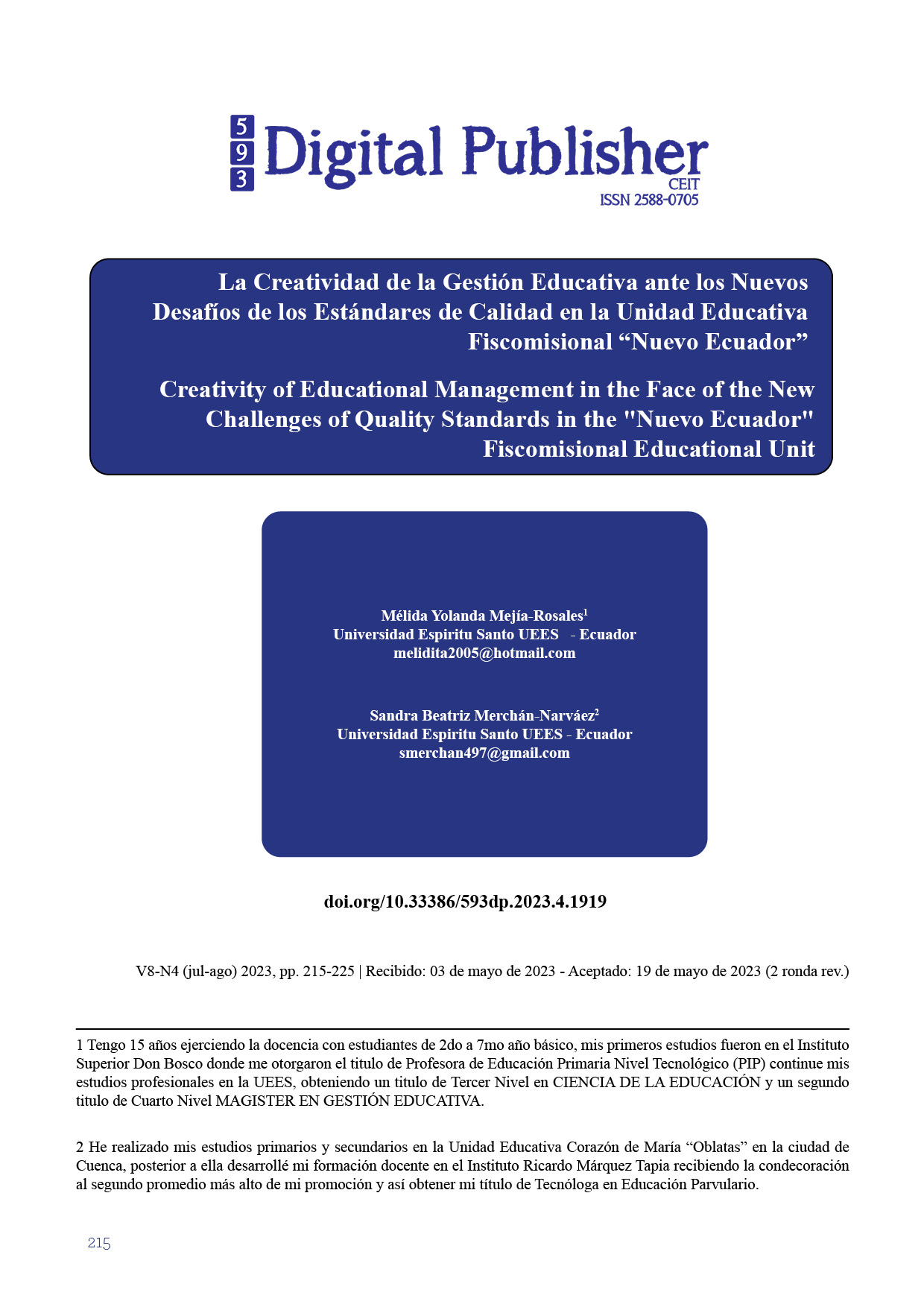Creativity of Educational Management in the Face of the New Challenges of Quality Standards in the "Nuevo Ecuador" Fiscomisional Educational Unit
Main Article Content
Abstract
The present investigation had the purpose of establishing through analysis the incidence of creativity in educational management in the face of the new challenges of quality standards in students to improve academic performance with the update in teaching and administrative work and its new active techniques, Taking into account that educational management is a relevant issue for the entire educational community, it guarantees balanced processes accompanied by optimal planning that allow academics and administrators to merge and achieve maximum institutional performance; where leadership and educational management prevail, maintain assertive communication with all the actors in the process in order to strengthen the maximum potential of the entire educational community. The quantitative research was of a basic type of a descriptive and correlational nature, where methods, techniques and instruments were applied that helped to collect information through a Google form, the corresponding sample was 60 teachers from the evaluated institution, an interview was also carried out. free unsystematic for management (rector and vice-rector) allowing to know information about internal administration. The results show that both teachers and managers consider educational innovation essential, mentioning that the actions respond to the new demands of the curriculum, which seeks to train the student to be prepared to face new social problems, being able to give answers and help growth. socioeconomic of the country. It is concluded that despite the fact that teachers know the importance of innovation, greater effectiveness is required when innovating, for this they must be trained by professionals with knowledge of educational innovation.
Downloads
Article Details

This work is licensed under a Creative Commons Attribution-NonCommercial-ShareAlike 4.0 International License.
1. Derechos de autor
Las obras que se publican en 593 Digital Publisher CEIT están sujetas a los siguientes términos:
1.1. 593 Digital Publisher CEIT, conserva los derechos patrimoniales (copyright) de las obras publicadas, favorece y permite la reutilización de las mismas bajo la licencia Licencia Creative Commons 4.0 de Reconocimiento-NoComercial-CompartirIgual 4.0, por lo cual se pueden copiar, usar, difundir, transmitir y exponer públicamente, siempre que:
1.1.a. Se cite la autoría y fuente original de su publicación (revista, editorial, URL).
1.1.b. No se usen para fines comerciales u onerosos.
1.1.c. Se mencione la existencia y especificaciones de esta licencia de uso.
References
Aguilar, A. J., Ortiz, W., Arévalo, J. F., & Carrillo, D. D. (2018). Política pública para la primera infancia: alcances desde su gestión educativa. Espacios, 39(52).
Barbón Pérez, O. G., & Fernández Pino, J. W. (2018). Rol de la gestión educativa estratégica en la gestión del conocimiento, la ciencia, la tecnología y la innovación en la educación superior. Educación Médica, 19(1). https://doi.org/10.1016/j.edumed.2016.12.001
Bertel Narváez, M. P., Viloria Escobar, J. de J., & Sánchez Buitrago, J. O. (2019). Tendencias de investigación en los posgrados de gestión educativa en América Latina. Educación y Educadores, 22(2). https://doi.org/10.5294/edu.2019.22.2.3
Botero Chica, C. A. (2009). Cinco tendencias de la gestión educativa. Revista Iberoamericana de Educación, 49(2). https://doi.org/10.35362/rie4922100
Castro Castaño, L. M. (2019). La política pública de inclusión: utopía de la gestión educativa en Colombia. Análisis, 52(96 (EN-JU)). https://doi.org/10.15332/21459169/5295
Cavagnaro, C., & Carvajal, C. (2020). El Liderazgo Transformacional en la Gestión Educativa en la Unidad Educativa República de Francia de Guayaquil. 593 Digital Publisher CEIT, 6(1). https://doi.org/10.33386/593dp.2021.1.457
Flores Ledesma, K. N., Montoya Vargas, A., Vasquez Llamo, C. E., & Cánez Palomino, R. W. (2021). Gestión educativa descentralizada con enfoque territorial. Revista Venezolana de Gerencia, 26(5 Edición Especial). https://doi.org/10.52080/rvgluz.26.e5.5
Guivin Guadalupe, A. L. (2018). Modelo de Liderazgo Transformacional para mejorar la Gestión Educativa en la Universidad Nacional de Jaén, 2017. Universidad César Vallejo.
Herrera Diaz, G. M. (2021). La gestión educativa y su relación con el desempeño docente en la Institución Educativa “Sagrado Corazón” de Arequipa, 2020. In UNIVERSIDAD NACIONAL DE SAN AGUSTÍN DE AREQUIPA.
Martí, R., Gisbert, M., & Larraz, V. (2018). Ecosistemas tecnológicos de aprendizaje y gestión educativa. Edutec. Revista Electrónica de Tecnología Educativa, 64. https://doi.org/10.21556/edutec.2018.64.1025
Olguín Guzmán, E., & Fallas Garro, A. L. (2020). Percepción en la implementación de modelos de gestión educativa en instituciones de educación superior. Boletín Científico de La Escuela Superior Atotonilco de Tula, 7(13). https://doi.org/10.29057/esat.v7i13.5296
Pedrozo-Conedo, Z. E., Fernández, P. A., & Raspa-D’Inzeo, G. (2018). Características del modelo de gestión educativa estratégica en instituciones públicas. Praxis, 14(2). https://doi.org/10.21676/23897856.2666
Peñafiel-Villagómez, D., & García-Montero, G. (2021). La efectividad de la comunicación asertiva en la gestión Educativa del Colegio de Bachillerato Técnico “Simón Bolívar.” 593 Digital Publisher CEIT, 6(2–1). https://doi.org/10.33386/593dp.2021.2-1.533
Pita-Torres, B. A. (2020). Políticas Públicas y Gestión Educativa. Civilizar, 20(39). https://doi.org/10.22518/jour.ccsh/2020.2a09
Romero Medina, G. M. (2018). Calidad educativa: engranaje entre la gestión del conocimiento, la gestión educativa, la innovación y los ambientes de aprendizaje. Revista de Estudios y Experiencias En Educación, 17(35). https://doi.org/10.21703/rexe.20181735romero6
Romero, S. L., & Santa María, H. R. (2021). Factores que intervienen en la gestión educativa. Revista Varela, 21(58).
Vera-Mendoza, M. B. (2018). Las estrategias educativas como vía para una gestión educativa eficiente. Polo Del Conocimiento, 3(3). https://doi.org/10.23857/pc.v3i3.444



